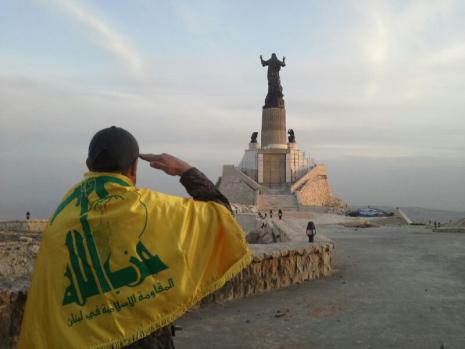The "Syrian Opposition" were in rush to get Hezbollah involved in their conflict with the Syrian government since the first moments of their engagement.
Ibrahim Al Amin, Hassan Olleiq - Al-Akhbar
 The "Syrian Opposition" were in rush to get Hezbollah involved in their conflict with the Syrian government since the first moments of their engagement. The rush was caused only - as subsequent events showed - by the firm belief among the opposition leaders in the West-Israeli-Gulf-Turkish axis, that the fall of the 'regime' was only a matter of weeks, and that the fateful link between Hezbollah and the 'regime' is fundamental. In addition, Hezbollah opponents in Lebanon were also in rush to materialize this link, for being convinced that they do not need to take Hezbollah into account as long as he will be toppled soon.
The "Syrian Opposition" were in rush to get Hezbollah involved in their conflict with the Syrian government since the first moments of their engagement. The rush was caused only - as subsequent events showed - by the firm belief among the opposition leaders in the West-Israeli-Gulf-Turkish axis, that the fall of the 'regime' was only a matter of weeks, and that the fateful link between Hezbollah and the 'regime' is fundamental. In addition, Hezbollah opponents in Lebanon were also in rush to materialize this link, for being convinced that they do not need to take Hezbollah into account as long as he will be toppled soon.
Hezbollah detected these data early, and was being able through different means, to get acquainted with how to handle opponents on the ground and in foreign communications. The party soon understood the strategic vision of those who quickly and effectively work to abduct and exploit the civil objections, towards a program that exceeds the demands of reform.
Hezbollah had a brief conclusion, although he postponed talking about it, or even to deal with it realistically, which facilitated his deep understanding of the conflict between the axis of resistance and the Israeli - regional - international axis. However, the red light was sparked by the state of hostility that emerged from the prominent powers in opposition. Yet, the party maintained a delicate and slow march in the Syrian minefield, observing at times and mediating between opponents and the Syrian administration many often.
Hezbollah is aware that the revitalization of Takfiri bases among the civilian and popular mediums - where opposition forces are strongly represented - has additional targets that serve the main goal itself against Hezbollah and the resistance. Sectarian vocabularies emerged in dealing with the Syrian and non-Syrian supporters of the 'regime'. It was clear that the dragging everyone to doctrinal war has become a key demand of supporters of the militants in Syria, who considered that raising the slogan of «War of Sunnis» would increase fanaticism and create a offensive ground against Hezbollah in specific.
Trying to accuse Hezbollah of the murder and beating charges, pro-militants in Syria were looking for strategic trap for Hezbollah and his environment. From here, they moved towards targeting the Shiite sanctities, especially the shrine of Sayyeda Zeinab south of Damascus. Soon, Hezbollah sought the approval of the Syrian leadership to deploy groups of fighters to prevent the militants' control over the shrine. This was the first public reference to Hezbollah intervention. For a long time , Hezbollah fighters didn't carry out any offensive action, but many of them were killed while being stationed at points meant to protect the shrine.
Furthermore, Hezbollah was not unaware of the many people seeking to harm him immediately. He was astonished by the political shortcomings of the armed groups' sponsors and by those who work with them in Lebanon as well. But what happened is that, in a place not far from Syria and where the real operating room is established, a known party decided to escalate the direct threat against Hezbollah. It decided to keep up with the global media campaign against Hezbollah because he stands by the government of President Bashar al-Assad via a Lebanese internal campaign to make his weapons a source of danger to the Lebanese. But the practical step was required in a sensitive point of Hezbollah. In this context, the armed opposition and those who stand behind them committed the "strategic mistake" by opening the battle of "cleansing" in border villages with Hermel district.
The Qussayr region imposed itself on Hezbollah's popular incubator and, consequently, on his leadership, where operations were a formal invitation and mandatory for Hezbollah to intervene militarily, and in a different way this time. At this moment, the Syrian opposition abandoned "linking the conflict" with Hezbollah and rushed towards direct military confrontation.
Expect in Part 2:
- Long Border a Year Ago
- Resistance Begin to Move